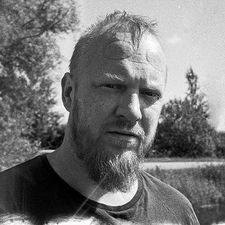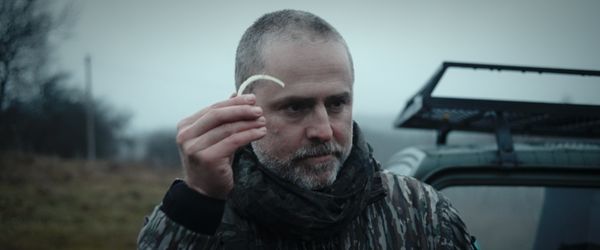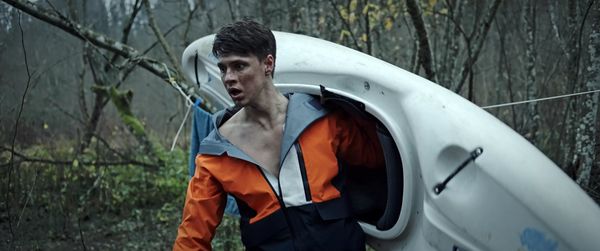 |
| Andrejs (Igors Selegovskis). Ugis Olte: 'They say that Christianity was brought here 800 years ago by Germans, but I feel that they haven't succeeded yet because we have a lot of this pagan mindset' |
Amber Wilkinson: You've sort of moved from the very factual in terms of documentary to the very fictional because you’re getting into the mythic with this film. What inspired you to take on a fiction feature that’s quite different from the sort of documentary work you've done before.
The other thing was, I took a walk in my hometown, where I grew up and suddenly I found myself in a lair of wild boars. It’s considered to be the most dangerous thing in Latvian nature, a wild boar mother with piglets. I really freaked out and I kind of became disoriented. I got lost that day in a place that I know by heart. And that was something that I really liked, this feeling that your imagination starts to conjure up mythological things - suddenly you are back to, I don't know, two million years ago, when people saw the world differently, and you suddenly are back to that level. And suddenly you experienced nature as something alive, supernatural, filled with unseen forces.
AW: I feel like in Baltic States in general - Latvia, Lithuania and Estonia - there's a genuine sense of the mythical that still kind of exists around forests because you have so many of them. In a way, in Scotland, we have a little bit of that as well, because we have a lot of that sort of landscape too. Is that something that you feel as well that Latvia has a sort of mythical idea around forests.
UO: Maybe it's more like the people developed stories about the tiniest details, like ordinary trees can suddenly become a tree with a story, which deals with life and death. Also, they say that Christianity was brought here 800 years ago by Germans, but I feel that they haven't succeeded yet because we have a lot of this pagan mindset. Like, when I watched the film Midsommar two years ago - it's basically how we spend our summer solstice.
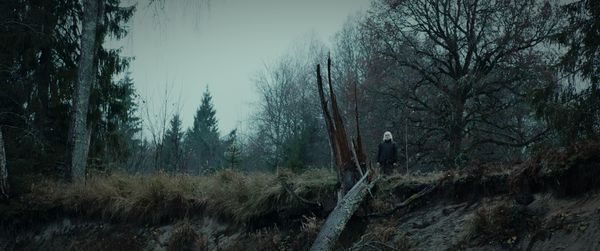 |
| Ugis Olte: 'We knew that we had to shoot this film on a really tight budget and we decided early on that we will have a super small crew and we will not use artificial lighting' |
AW: Did you draw on any specific Latvian myths when you were writing it? Or was it just all from your imagination?
UO:Well, it's a more subjective sense of mythological beings. Actually, all Latvian fairy tales except one have happy endings. They never have big big tragic turns of events. So that is one thing that was in common. But there are also few references to Scandinavian mythological creatures like all these water nymphs or water spirits. We don't have them that much but that's something that is more Scandinavian and also the violin player who tries to trick lost souls into his kingdom, that's also a Scandinavian thing.
AW: Did the fact that you'd shot documentaries before help when it came to shooting this because you were out in the forest and doing stuff a long way from film sets.
UO: In two ways. My everyday sport is making TV documentaries, we have numerous series going on simultaneously and that means that I spend a lot of time travelling inside my own country. And like all the phrases you hear or some glimpses, or how that particular wooden building looks, all these things, collect in some kind of basket and then I probably reinterpret it in fiction. The other thing is that we knew that we had to shoot this film on a really tight budget and we decided early on that we will have a super small crew and we will not use artificial lighting. So we basically shot it in the same way we shoot our travel documentaries. And in that sense, we could do it in 17 days basically. Also you just know how to get dressed when you spend the whole day outside.
AW: What about your cast? What time of year did you shoot this film? They look like they were pretty game, stripping off in the middle of nowhere.
UO: My thought at all after all this is that probably actors have pretty boring lives because they were really excited to go into these extreme situations. But I was thinking, is there any scene that contains some activity that I wouldn't do myself if I needed to? I couldn't find a single one that I wouldn't do. I was always ready to say, 'Okay, you are a sissy, I'll show you it's doable" but I never had to.
AW: Was it quite warm when you were shooting, I was thinking it must have been a bit of a challenge.
UO:Actually, it was exactly one year ago. The last day of shooting was plus eight Centigrade. The water was probably a bit warmer. Two days after we wrapped there were the first flakes of snow.
AW: Did that present any logistical difficulties to be shooting like that, because shooting in those conditions can't be easy, I assume.
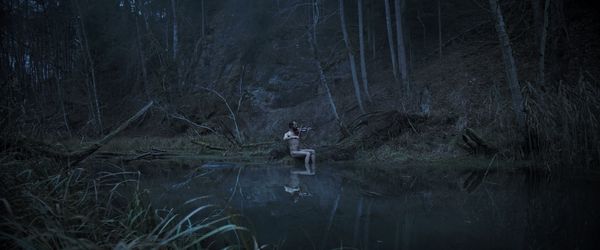 |
| Ugis Olte: 'All Latvian fairy tales except one have happy endings. They never have big big tragic turns of events ' |
AW: It's interesting that you worked with two other writers on the film as well. How was that sort of collaborating? Did it help because one of the others was Brazilian, so not not associated with Latvia at all? Did it help having that sort of outsider viewpoint alongside yours?
UO:Yeah, we made the conscious decision to introduce a foreign eye, somebody who doesn't know anything about Baltic view on life, or our values or mythology. So when I had the first draft, just like, a vomit of words onto the page that I just got out of myself, at that point, we went to Tallinn, I think it was three years ago or two years ago. We watched young writers pitching their ideas. And we kind of checked with my producer – that person looks like our type of person. And then we just approached them. We translated the copy of the first draft and we gave it to them. And then we basically started from scratch and wrote the new treatment using the elements that I had in this first draft. And when we finished the treatment together, then I did the last rewrite.
AW: So it was quite helpful to be able to bounce those ideas around the three of you?
UO:You can use them to notice some value in something that maybe I feel is already mundane and vice versa. They can say, "Ah, this is too local".
AW: Do you as a writer/director had some sympathy with Andrejs, your character who's trying to control everything and who discovers that he can't control everything. As a director I wonder if maybe you feel a bit like that sometimes on set, that you want to control everything but it just carries on.
UO:No, I enjoy the set of a fiction film just for the fact that it's a collective of many people who can contribute things that I will never come up with. That is the whole fun. I think if I was that kind of control freak, I would make small animation films all by myself.
AW: The way you bring the sort of primal into the film is quite interesting. Also, because it's quite playful, there's a lot of humour in this film. Perhaps people associate primal things with very hard emotions, you're quite playful about it. Did you deliberately want to get that slightly lighter tone into the movie?
UO: Yeah, because that's a 100% empirical feeling. Usually when you go on longer trips or or spend longer time outdoors it's like a snail crawling. At the start of the journey, he has a lot of slime on his belly but then as he travels all the slime is left on the ground and his belly is drier and drier. And when you lose this civilised slime, you don't become like darker, you become really relaxed. And usually on the third day, people have completely different jokes, they can laugh about the smallest details, it is a light feeling. Getting back to that primal state of existence is always delightful, it's never dark.
AW: Even though it appears that things are becoming darker and darker, in fact, there's a much lighter, kind of primal activity going on.
UO:That's just because all the dark stuff happens inside the main character's head. Actually, in reality, almost nothing bad happens. People get rid of their anxieties they just discharge. It's a completely positive event.
AW: How do you feel about influences? I'm still not sure. Bloggers and social influences?
UO:Well, I'm still a student of journalism. I kind of paused this process 20 years ago, and now I restarted two years ago. Now, as a student of mass communication, I have to pay attention to these new phenomena. And well, last week, I had a seminar about influencers and my conclusion is that I wasn't thinking too well of them. But now, after I paid attention, it got even worse. I just can't understand how it's possible that you are famous because you are famous. And, actually, you don't have an identity, like, what is the reason you are famous?
I have also done some commercial work. And this breed of marketing people, they are quite something, they are characters. They have high powered positions, but usually they are not the brightest bulbs in the box. Of course, there are exceptions, but a lot of situations come out of when people have too much energy and too much power to tell other people what to do.
AW: Do you think you might do more fiction in the future? Or, or do you think you'll do a blend documentaries and fiction.
AW: How it was to work with a cinematographer who is obviously very experienced. How was that kind of collaboration?
UO: He has a very similar background to me, he also grew up in a rural town, he has done the same shit that I have like, for example, in the spring, when the blocks of ice float in the river, sometimes you use them as rafts, stuff like that. And we didn't have to have any discussions about what is it that we are showing, he just knew. Maybe the only thing that I had to push away was cinema professionals, they tend to enjoy making things up like, 'Okay, we will take this really ordinary roadside puddle and make it very special'. I said, 'Why do you have to make it special? Let's let's walk 15 minutes inside the forest, and we will have the most special puddle. That kind of stuff, avoiding using all those tricks. Better to walk further in the forest to get the real thing.
AW: That's your documentary background coming in there.
UO: Yeah. And also the second biggest argument was with the production line producer, I really had to convince them – and in that question, my DOP was totally on my side – that we don't need these portable toilets. I said, 'No, we just take a spade and a roll of paper and that will be our toilet. You can walk in the forest, dig a hole and that's it. You don't have to bring this blue plastic box to the side of the forest. Yeah, that was the biggest conflict.
AW: So are you working on new projects now?
UO: I made a document and it has a few words in it. I think. I think it's a good seed. I want to make a time travel film, but in which not the physical body travels but only the mind. But that's still in the fermentation phase. Yes, fermenting in my head, and nothing has leaked out yet.
Upurga is screening at Black Nights Film Festival as part of the Baltic Film Competition








